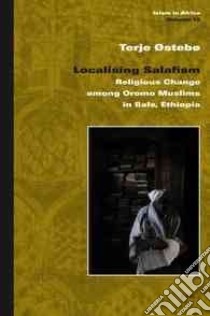Localising Salafism - 9789004184787
Un libro in lingua di Terje Esteb edito da Brill Academic Pub, 2011
- € 188.80
- Il prezzo è variabile in funzione del cambio della valuta d’origine
Exploring the reasons for the current dominance of Salafist Islam in the Ethiopian province of Bale, Østebø (African studies and religion, U. of Florida) insists that all such explanations must be understood in terms of local contextual developments and that it is imperative "to see religious change as complex dialectical interactions between impetus and response, between agents and audiences". Thus, his narrative chronologically traces the waning and waxing influence of Salafist Islam through discussions of the displacement of Islam through the arrival of the Oromo people in the 16th century; the gradual embrace of Islam by the Oromo as spurred by the general Sufi revival and the restitution of the pilgrimage to the tomb of the 13th century figure Sheikh Hussein (credited with introducing Islam to the region); the increase of Ethiopian pilgrims to Mecca and the expansion of the khat trade in the 20th century during the period of Italian occupation, which led to greater contact with Salafism; Saudi Arabian efforts to counter the secular Arabism of Egypt's Gamal Abdel Nasser through the promotion of Salafist Islamic educational institutions in the Muslim world; local resistance to the literary tradition of Salafism, which emphasizes the importance of the written (Arabic) word; the antipathetic attitude towards religion of the military junta that came to power following the overthrow of Haile Selassie; and the subsequent reversal of restrictions on religion following political transition in 1991, which allowed Salafism relatively unimpeded growth opportunities, in part due to attitudes spurred by the previous era's repression of religious activities. He further argues that Salafism as currently practiced in Ethiopia is generally devoid of a political agenda and that the Salafis of Bale instead tend to politically gravitate towards Oromo ethno-nationalism. Annotation ©2011 Book News, Inc., Portland, OR (booknews.com)
Informazioni bibliografiche
- Titolo del Libro in lingua: Localising Salafism
- Sottotitolo: Religious Change Among Oromo Muslims in Bale, Ethiopia
- Lingua: English
- Autore: Terje Esteb
- Editore: Brill Academic Pub
- Collana: Brill Academic Pub (Hardcover)
- Data di Pubblicazione: 31 Dicembre '11
- Genere: SOCIAL SCIENCE
- Argomenti : Islam Ethiopia History Salafyah Ethiopia Oromo (African people) Ethiopia
- Pagine: 350
- ISBN-10: 9004184783
- EAN-13: 9789004184787


